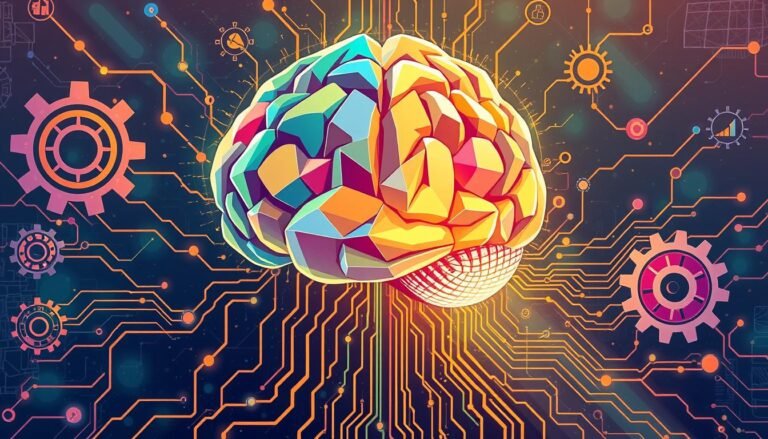Psychological Feedback Mechanisms
Psychological feedback mechanisms are key in shaping our behaviors and emotions. They involve complex thinking processes that help us adjust to our surroundings. Through feedback, we learn to change our actions based on what happens next.
Studies show that 75% of people do better when they get regular feedback. This shows how important emotional control is in our daily lives. Feedback loops are crucial for learning, knowing ourselves, and growing personally.
In therapy, 85% of therapists use feedback to help their clients. These methods aid in developing better coping strategies and improving well-being. Feedback is also effective in education, with 90% of teachers believing it boosts student learning.
Key Takeaways
- Feedback mechanisms are vital for behavioral change and adaptation
- Cognitive processes play a key role in interpreting and responding to feedback
- Emotional regulation is enhanced through effective feedback systems
- Behavioral reinforcement helps solidify positive changes
- Feedback loops are widely used in therapy and education
Understanding the Core Principles of Behavioral Response Systems
Behavioral response systems are key in how we interact and learn. They guide our actions, thoughts, and feelings through feedback loops. Studying these systems requires looking inward and understanding how our brains adapt.
The Role of Operant Conditioning in Feedback Loops
Operant conditioning shapes our behavior through rewards and punishments. If a behavior gets a positive result, we tend to do it again. But if it leads to trouble, we’re less likely to repeat it. This creates loops that help or change our actions over time.
Neural Pathways and Information Processing
Our brain’s neural paths are vital for handling feedback. Through introspection, our brains build new connections and change old ones. This ability to change helps us learn and adapt to new things.
Basic Components of Psychological Feedback
Psychological feedback has three parts: stimulus, response, and consequence. A stimulus prompts a response, which then has a consequence. This cycle shapes our future actions. Knowing these parts is key to adapting our minds well.
“Emotions are a complex reaction pattern, involving experiential, behavioral, and physiological elements.” – American Psychological Association
Studies show that our body’s reactions are strongest when our faces show what we feel. This shows how important it is to be true to our emotions. By grasping these ideas, we can improve how we respond and encourage positive changes.
The Science Behind Positive and Negative Feedback Loops
Feedback loops are important in our bodies and minds. They affect how we behave, feel, and even physically respond. Knowing about these loops helps us understand how we adapt to our surroundings.
https://www.youtube.com/watch?v=9yEPHUKyBOM
Positive feedback loops make changes bigger. For example, when an apple ripens, it can make nearby apples ripen faster too. In our minds, this can show up as feeling more anxious in social situations. The more we stay away from social events, the more anxious we get, creating a cycle.
Negative feedback loops, however, help keep things stable. Our body temperature is a great example. When we get too warm, we sweat to cool down. This keeps our body temperature steady, a state called homeostasis.
Self-evaluation loops are a key part of our mental feedback mechanisms. These loops involve checking our thoughts, feelings, and actions. They can be positive or negative, affecting how we see ourselves and make choices.
“Approximately 60-80% of medical conditions and diseases are linked to altered homeostasis.”
Psychosomatic responses show the strength of these feedback loops. Our thoughts and feelings can cause physical reactions, which then affect our mental state. This connection between mind and body is central to many therapies.
It’s crucial to understand these feedback loops for effective mental health treatments and promoting good behaviors. By working with these natural processes, we can improve our mental and physical health.
Psychological Feedback Mechanisms in Human Behavior
Psychological feedback mechanisms shape our actions and reactions. These systems work through Behavioral Reinforcement and Emotional Regulation. They influence how we process information and respond to our environment.
Conscious vs. Unconscious Feedback Processing
Our brains process feedback both consciously and unconsciously. Conscious processing involves active thinking about our actions and their outcomes. Unconscious processing happens without our awareness, often driving habitual behaviors.
Emotional Response Patterns
Emotions play a key role in Behavioral Reinforcement. Positive emotions reinforce actions, while negative ones deter them. This emotional feedback loop happens quickly, shaping our behavior over time.
Cognitive Processing in Feedback Systems
Cognitive processing in feedback systems involves integrating various types of information. This includes our perceptions, memories, and expectations about consequences. The interplay of these factors guides our decision-making and behavior adjustments.
| Feedback Type | Processing | Impact on Behavior |
|---|---|---|
| Conscious | Active thinking | Deliberate behavior changes |
| Unconscious | Automatic processing | Habitual responses |
| Emotional | Quick response | Immediate reinforcement |
| Cognitive | Information integration | Long-term behavior shaping |
Understanding these feedback mechanisms can help us improve our Emotional Regulation and make more mindful choices. By recognizing the role of both conscious and unconscious processes, we can better navigate our behaviors and responses to various situations.
Neuropsychological Adaptation and Learning
Neuropsychological Adaptation is key in how our brains handle feedback. It involves many cognitive processes that help us learn and adjust to our surroundings.
Brain Plasticity and Feedback Integration
Brain plasticity lets our neural networks change and reorganize with new experiences. This flexibility is crucial for integrating feedback and making new connections. As we face different situations, our brains adapt, making our information processing more efficient.
Memory Formation in Feedback Loops
Memory is essential in feedback loops. Our brains keep past experiences, guiding our future actions. This helps us learn from mistakes and repeat successes. Short-term and long-term memory work together to shape our feedback responses.
Adaptive Learning Mechanisms
Adaptive learning mechanisms let us change our behavior based on feedback. These systems help us get better over time. Through trial and error, we develop better strategies for overcoming challenges.
Research emphasizes the role of neuropsychological assessments in understanding these processes. A study of 72 veterans showed how feedback methods affect memory recall:
| Feedback Method | Recall Improvement | Average Age | Average Education |
|---|---|---|---|
| Oral Only | Baseline | 60.6 years | 12.4 years |
| Oral + Written | Higher | 60.6 years | 12.4 years |
This data shows how different feedback methods can influence cognitive processes and learning results. By grasping these mechanisms, we can create better strategies for neuropsychological adaptation and learning.
Self-Regulation and Emotional Intelligence
Self-regulation and emotional intelligence are vital in our daily lives. They help us manage our feelings, make smart choices, and adjust to new situations. Emotional regulation means controlling our emotions, while self-evaluation helps us check and change our actions.
Research shows that those with high emotional intelligence do well in school and work. They handle stress well, build strong relationships, and stay strong under pressure. But, those with low emotional intelligence might find it hard to communicate and control their feelings.
Self-regulation, a key part of emotional intelligence, leads to many good things. These include:
- Better stress resilience
- Increased happiness
- Improved overall well-being
Studies show that mindfulness boosts attention, helping us manage negative emotions. Another strategy, cognitive reappraisal, is linked to feeling happy and satisfied every day.
For those in psychology or related fields, emotional intelligence is very important. It helps with school performance, managing stress, and improving communication. These skills are key in jobs like behavioral psychology, forensic psychology, and school psychology.
“Continuous learning and adaptability are critical leadership competencies in dynamic organizational environments.”
By improving self-regulation and emotional intelligence, we can handle personal and work challenges better. This leads to better mental health and career success.
Feedback Mechanisms in Therapeutic Settings
Psychological feedback mechanisms are key in therapy. They help therapists see how well treatment is working and make changes as needed. Yet, many rely more on their gut feeling than on actual data.
Clinical Applications of Feedback Loops
Feedback loops are vital in many therapies. They help spot and change bad thought patterns. In cognitive-behavioral therapy, they link thoughts, feelings, and actions. This is the foundation for many mental resilience strategies.
Therapeutic Intervention Strategies
Therapists use feedback to encourage good behaviors and challenge bad ones. This is crucial for building mental strength. A study showed that 61.5% of therapists never use standard progress measures. This shows there’s a need to better track patient results.
Measuring Treatment Effectiveness
It’s important to accurately measure how well treatments work. This lets therapists tweak their methods. A survey found over 90% of therapists rely on their own judgment, not data. This points to a need for more data-based therapy.
| Measure | Percentage |
|---|---|
| Clinicians using personal judgment | 90% |
| Organizations collecting standardized data | 75% |
| Clinicians never using standardized measures | 61.5% |
Using effective feedback mechanisms can greatly improve therapy results. It’s essential for creating strong mental resilience strategies and bettering mental health care overall.
Building Mental Resilience Through Feedback Systems
Mental resilience helps us get back on our feet after tough times. It’s about staying strong when life gets hard. Feedback systems are key to building this strength. They help us learn and grow from our experiences.
Developing Adaptive Coping Strategies
Coping strategies are how we handle stress. Adaptive strategies help us deal with problems in healthy ways. They’re crucial for mental resilience. Here are some ways to develop these strategies:
- Practice mindfulness
- Learn problem-solving skills
- Build a support network
- Exercise regularly
Strengthening Psychological Flexibility
Psychological flexibility means adapting to change. It’s about bending without breaking. This skill helps us manage how our mind affects our body. We can strengthen flexibility by:
- Accepting our thoughts and feelings
- Staying present in the moment
- Focusing on our values
- Taking action towards our goals
By working on these areas, we can build stronger mental resilience. This helps us face life’s challenges with more confidence and ease.
The Impact of Social Environment on Feedback Processing
Our social surroundings greatly affect how we handle feedback. A study of 264 employees from seven firms showed interesting results. It found that a supportive feedback environment boosts creative performance.
This study also showed that positive feelings help with creativity, while negative feelings can slow it down. It found that a positive work environment can make us more creative. This is because it helps us feel good and think better.
Age also plays a role in how we deal with feedback. Young adults and older adults both react quickly to feedback. But older adults feel less bad about negative feedback. This shows that our emotional processing changes as we get older.
Knowing how our social environment affects feedback is crucial. It helps us create better places for growth and creativity. This knowledge is important in schools, workplaces, and therapy.
Source Links
- Understanding Feedback Loop Psychology: Key Concepts and Applications – Monterey.ai
- A biopsychosocial model based on negative feedback and control
- Science of Emotion: The Basics of Emotional Psychology | UWA
- Exploring the Fundamentals of Behavioral Psychology: What You Need to Know – Carrus Health – Behavioral Health Hospital
- Positive and Negative Feedback Loops: Explanation and Examples
- Homeostasis and Feedback Loops | Anatomy and Physiology I
- How ‘feedback loops’ regulate human behaviour
- Feedback mechanism – Definition and Examples – Biology Online Dictionary
- How Feedback Loops Can Revolutionize Your Habits
- Neuropsychological Assessment – StatPearls – NCBI Bookshelf
- Comparing Two Methods of Delivering Neuropsychological Feedback
- The Role of Self-Reflection, Emotional Management of Feedback, and Self-Regulation Processes in Self-Directed Leadership Development
- The Importance Of Emotional Intelligence In Psychology Students | Psychology.org
- How to Develop and Use Self-Regulation in Your Life
- A Measurement Feedback System (MFS) Is Necessary to Improve Mental Health Outcomes
- Monitoring Treatment Progress and Providing Feedback is Viewed Favorably but Rarely Used in Practice
- Psychological interventions for resilience enhancement in adults
- Resilience in mental health: linking psychological and neurobiological perspectives
- Using a Feedback Environment to Improve Creative Performance: A Dynamic Affect Perspective
- Effects of positive and negative social feedback on motivation, evaluative learning, and socio-emotional processing – npj Science of Learning








